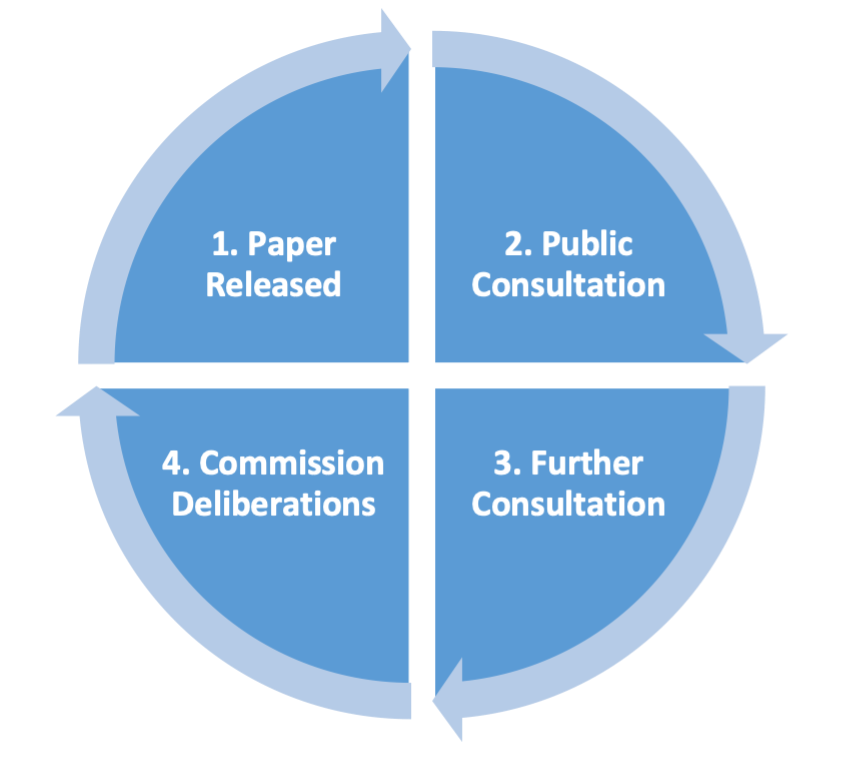The Law Reform Commission is empowered to review and consider any proposals for the reform of the law which may be referred to it by any person or authority. The Commission may also initiate law reform projects it considers appropriate without receiving a referral.


The Commission identifies areas of law in the Cayman Islands that need to be modernised, simplified, amended or developed for various reasons. These reasons may include concern by the community regarding a specific issue, recent events or legal cases that have highlighted an incompatibility or deficiency within the law, or other developments which make it necessary to modernise an existing law or create new laws.
The process of each law reform project differs according to the scope of the reform, the range of key stakeholders, the intricacy of the laws under review and the period of time allotted for the project.
Area for Reform
The Commission may independently decide to conduct research into any area of law and make recommendations for reform.
The Attorney General, Cabinet, Government Ministries, Government Departments, Members of Parliament, stakeholders or members of public may also refer an area for reform to the Commission.
Research
The first stage of the process is to examine the area of law and decide the scope of the potential reform. The staff of the Commission will conduct extensive research into the proposed area of reform and consult with key stakeholders who have particular expertise and experience in the laws under review. The Commission will consider the research and decide to publish an Issues, Scoping or Discussion Paper.
Scoping/Issues/Discussion Paper
The Commission will publish a Scoping, Issues or Discussion Paper for consideration by stakeholders and members of the general public.
The purpose of a Scoping Paper is to identify areas of potential reform and to seek feedback from the public as to whether an area requires further examination.
An Issues Paper identifies the issues involved in a proposed reform and offers a preliminary perspective on those issues in order to facilitate further discussion.
A Discussion Paper provides an in depth examination and analysis of the issues. It will conclude with proposed recommendations or questions for stakeholder consideration. A discussion paper is a key consultation tool to promote comment and criticism of the Commission’s findings and will often be accompanied by draft legislation to support the proposed reform.
Consultation
Publishing consultation documents is a key way the Commission involves the community in the process of law reform. The Commission will formulate and publish an Issues, Scoping or Discussion Paper, often along with supporting draft legislation, and invite stakeholders and members of the public to comment on the issues identified and submit their views on the recommendations presented for discussion. Through the submissions that the Commission receives, the Commission is able to gauge what people think about current laws and how they should be changed prior to finalising its recommendations. Submissions can contain comments on the recommendations raised in the Paper or anything concerning the topic under review. The Commission welcomes submissions from everyone.
The Commission will at times extend a consultation period, or conduct further consultation based on issues identified during an initial consultation period.
Final Report & Draft Bill
Once the consultation period has ended, the Commission will consider the submissions received, which will serve to inform the deliberations of the Commission in the preparation of a Final Report. The Final Report will include comprehensive research and examination of the area of law and the research findings of the Commission that were relied on in the formulation of the Issues, Scoping or Discussion Paper which set out the Commission’s initial recommendations. The Report will also summarise the submissions received that express different views and illustrate the scope of stakeholder perspectives on the area of reform.
The Final Report, generally supported by a draft Bill, will be delivered to the Attorney General, who in turn will present the Report to Cabinet.
When the Commission submits a Final Report, the Commission becomes functus officio, meaning it has no further mandate to progress the recommendations contained in the Final Report. The matter now lies with the Government of the day to determine the way forward.
Cabinet Approval
Once Cabinet receives the Final Report, Cabinet will then decide whether to accept some or all of the recommendations or reject the recommendations of the Commission. If Cabinet accepts the recommendations, the supporting Bill will be finalised by the Legislative Drafting Department and published for debate in Parliament. If Cabinet rejects the Commission’s recommendations, the Commission may reconsider its recommendations or take no further action.
Legislative Action
Once tabled in Parliament, proposed legislation is made publicly available. The Commission’s Final Reports may be viewed on the following websites: www.lrc.gov.ky or www.gov.ky.